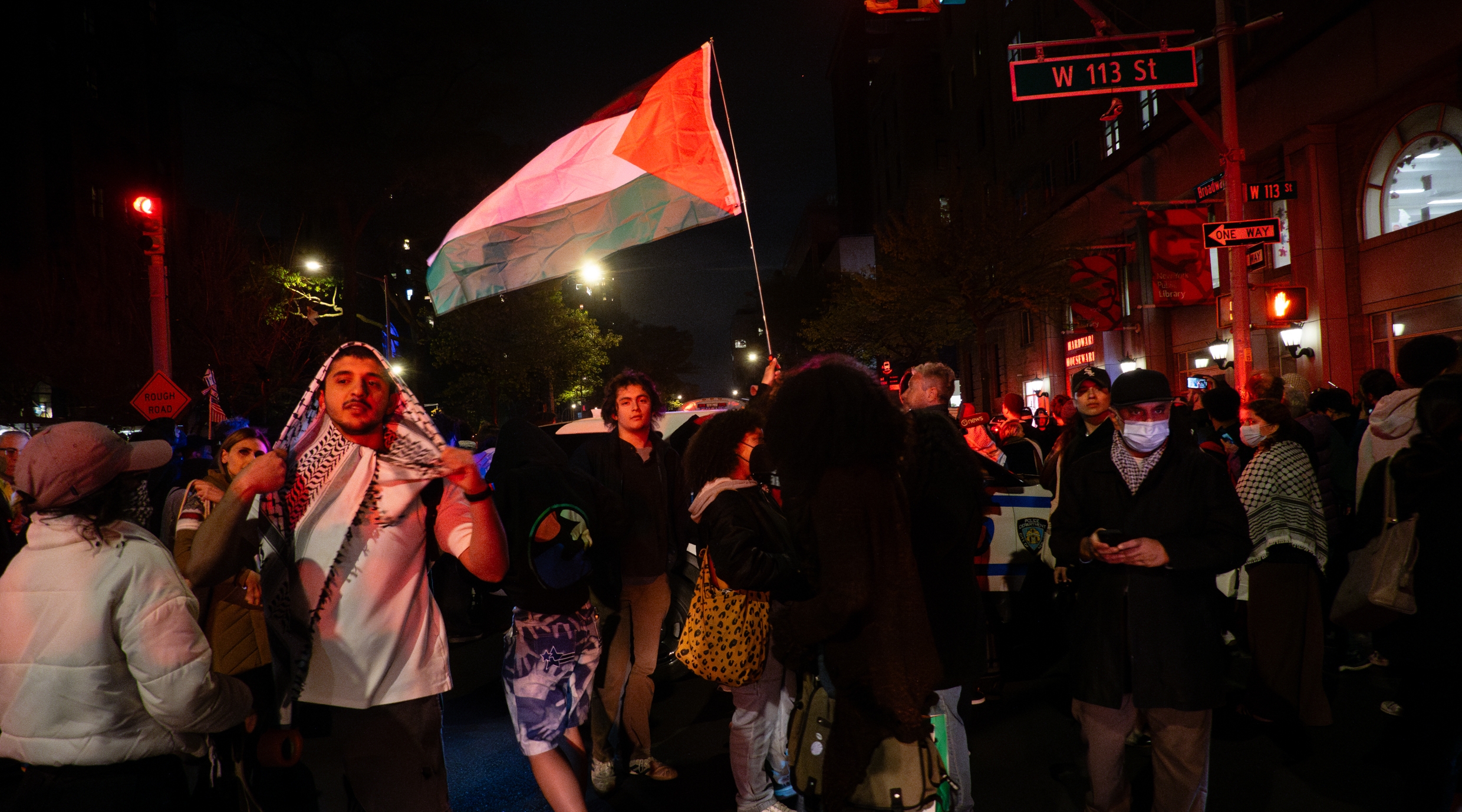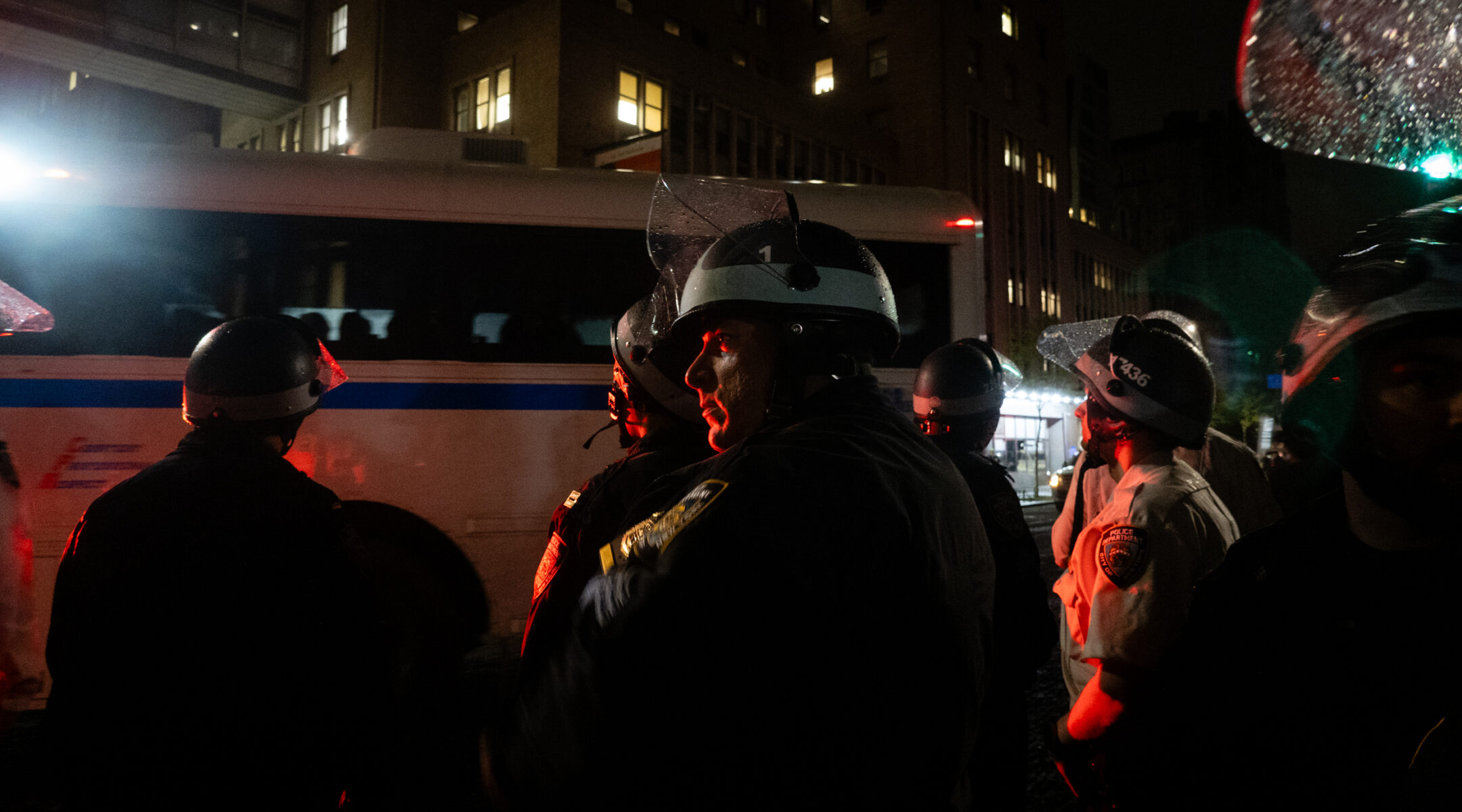(New York Jewish Week) – On Tuesday night, as police cleared protesters out of a Columbia University building and arrested more than 100 people, lawyer Gerard Filitti said fault lay with the students who had erected an unauthorized pro-Palestinian encampment at the school.
But they’re not the only ones he blamed. Although Columbia’s administration had called in the NYPD, Fillitti said Tuesday’s clashes were the result of inaction by Columbia’s leadership — not just during the two weeks of the encampment, but in the more than six months since the outbreak of the Israel-Hamas war.
“The university failed to maintain order on campus to provide for the safety of its students and to safeguard the civil rights of Jewish students,” Filitti, senior counsel of the Lawfare Project, which aids pro-Israel and Jewish students, told the New York Jewish Week. He called the worsening conditions for Jewish students “a direct result of the school’s failure to address antisemitism after Oct. 7.”
Filitti, along with others who oppose the encampments, had repeatedly called on Columbia to crack down on the pro-Palestinian activists. But now that that has occurred, they aren’t celebrating. Rather, pro-Israel groups want the school to do more to address the root causes of campus antisemitism. They’re calling on Columbia to enforce its rules, penalize faculty members and change campus culture. Some say its president, Minouche Shafik, must resign.
“Just because they’ve cleared away the encampment doesn’t mean that they have dealt with the underlying problems,” said Kenneth L. Marcus, the founder of the Brandeis Center, a legal advocacy group that has filed a number of federal civil rights complaints against universities over antisemitism.
Marcus said antisemitism has been an issue at Columbia for decades. He pointed to a 2004 documentary about antisemitism on campus called “Columbia Unbecoming,” which featured pro-Israel student activists including a young Bari Weiss.
“The university can’t just pretend that they’re dealing with a few students who are breaking the rules. The problem is deep within Columbia’s culture,” he said, also urging the university to replace faculty members who contributed to a hostile atmosphere for Jews.

Protesters outside Columbia University, April 30, 2024. (Luke Tress)
The university has taken steps to work toward the safety of Jews, including by setting up an antisemitism task force made up of faculty. The task force’s inaugural report, released in March, made policy recommendations and was applauded by Jewish groups. Columbia suspended its campus chapters of Students for Justice in Palestine and the anti-Zionist Jewish Voice for Peace in November for violating protest policies, but the same groups have continued to operate under the auspices of a consortium of student clubs called Columbia University Apartheid Divest. Columbia said it had suspended several students for hosting an unauthorized “Resistance 101” event on campus in late March that saw speakers praise Hamas.
“We are committed to sustained, concrete action to make Columbia a community where Jewish students and everyone feel safe, valued and are able to thrive,” a Columbia spokesperson told the New York Jewish Week on Wednesday. “Enforcement may be necessary at times, but it is not sufficient. That’s why our Antisemitism Task Force is empowered to identify practical ways to enhance support for our Jewish students.”
The spokesperson added, “Columbia endorsed the Task Force’s first set of recommendations, and their work is ongoing. We look forward to their recommendations across a range of areas like academic and extracurricular offerings and student, faculty, and staff training programs.”
The new CEO of the Jewish Community Relations Council of New York, Mark Treyger, echoed Filitti in saying the upheaval was “the result of a university that had no plan over the last 6 1/2 months since October 7th to deal with rising levels of hate, particularly antisemitism.”
Marcus said one possible avenue for further action is one his group has pursued at several schools: outside legal action. Columbia already faces a congressional investigation, a Department of Education investigation and civil lawsuits. Protections have become “a national issue,” he said. He also praised the Antisemitism Awareness Act, which passed the House of Representatives on Wednesday and would compel federal civil rights agencies to use a popular and contested definition of antisemitism when adjudicating claims.
“There is a crying need for stronger legal protections” at Columbia and other campuses, Marcus said, also predicting that there would be more civil lawsuits filed against the university.
Jewish groups also called on the university to enforce its existing rules, such as entry restrictions. While outsiders have frequently been barred from campus since Oct. 7, New York City Mayor Eric Adams said Wednesday that “outside agitators” had stoked the protest — though he provided little concrete evidence.
Ari Shrage, a board member of the Columbia Jewish Alumni Association, also demanded the university enforce its rules against unauthorized protests, which had been going on for months. Shafik said during her Congressional hearing in April that 15 students had been suspended for violating school policies. Some students were suspended last month, but the exact number is unclear, and Shafik did not mention suspensions in her statement on Wednesday.
Shrage said that the university has been lax in holding students accountable.
“The university didn’t enforce them and then the students said, “OK, we’re going to try something else and see if we get away with it,’” he said. “There were no consequences and this is what you get.”
The UJA-Federation of New York called the police action “an important step in restoring a safe environment,” while urging further steps to combat antisemitism.
“We urge Columbia — and universities across the country — to enforce existing rules promptly and transparently,” the federation said in a statement.
Fillitti also called on the university to replace Shafik. A president who “flip-flops on what to do with encampments is not someone who should maintain their job,” he said.
“One of the clear signals that Columbia could give is to replace its leadership,” he said. “In an ideal world, the school would recognize publicly that it has been making missteps.”
He also criticized the administration for holding negotiations with leaders of the unauthorized protest as way of “appeasing the loudest and the most aggressive group on campus.”
Shrage said the university needed to take a long-term approach to tackling the problem.
“It’s not going to be an overnight fix, it’s going to be a long process and we hope that the leadership takes this seriously and doesn’t just try to put a Band-Aid on it and think that calling the police this time will fix the problem,” he said.
The New York Jewish Week brings you the stories behind the headlines, keeping you connected to Jewish life in New York. Help sustain the reporting you trust by donating today.





